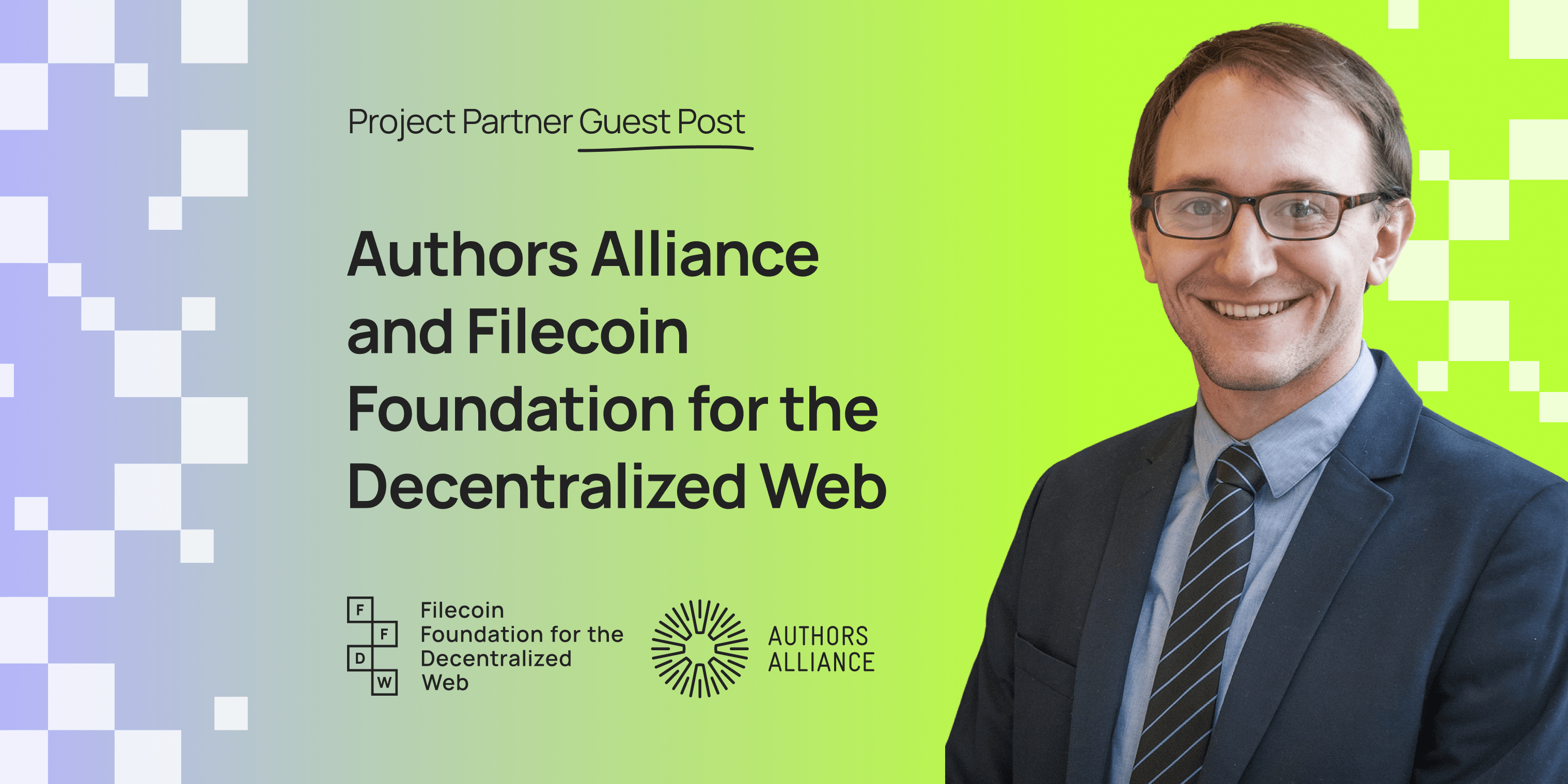Authors Alliance and Filecoin Foundation for the Decentralized Web: Supporting Public Interest Authors with Decentralized Tools

This is a guest post from FFDW project partner, Authors Alliance, written by Dave Hansen, Authors Alliance Executive Director.
Authors Alliance launched in 2014. We were founded with the support of creators –– like Jonathan Lethem, Katie Hafner, Cory Doctorow and Kevin Kelly –– who understood the role that technology can play for authors, enabling new research and forms of creative expression and ensuring long-term access to their own intellectual legacy. Ever since, we've been advising and informing creators of their rights in a fast-changing digital world, as well as defending those principles in court. This year, Authors Alliance is celebrating 10 years of advancing the interest of authors who want to serve the public good by sharing their creations –– playing a crucial role in helping authors understand the nexus of creativity and technology.
On the cusp of the 10th anniversary of Authors Alliance, we're excited to collaborate with Filecoin Foundation for the Decentralized Web (FFDW) on how the decentralized web and protocols like Filecoin can support the preservation of copyrighted works.
One particular challenge we focus on at Authors Alliance is text and data mining (TDM), which involves extracting information and deriving patterns from datasets. TDM research holds incredible promise for yielding new insights into human creativity and language, allowing research to identify hidden patterns across massive corpora –– from computer code to scientific articles. Authors Alliance and many of its founding members played an important role as amici (outside expert "friends of the court") in establishing the transformative nature of these uses before the courts in Authors Guild v. Google and Authors Guild v. HathiTrust.
Both cases significantly influenced how copyrighted digital content can be used under the fair use doctrine, especially for crucial educational and research purposes like indexing, search, accessibility, and preservation. These precedents shaped the landscape of digital copyright law, encouraging the proliferation of digital libraries and other scholarly resources. Those precedents also support a wide variety of other new, non-expressive technological uses such as data ingestion for AI and machine learning, where the decentralized web and protocols like Filecoin can play a key role. We, at Authors Alliance, want to expand those exemptions in the upcoming Digital Millennium Copyright Act (DMCA) triennial rulemaking so collections of written text created by one researcher can be shared with others.
The expansion of licenses that restrict fair use is another major challenge that we're aiming to tackle at Authors Alliance. As an increasingly concentrated group of distributors control access to the vast majority of creative works online, their terms of service place contractual limits on many downstream fair uses. The practical effect is that humanity's most important information –– millions of books, movies, songs –– are locked up by contracts that limit productive uses that the law and policy behind fair use would allow. Beyond TDM, these licenses pose an incredible challenge to another fair use: preservation and access through the decentralized web. They also threaten to usurp fair use in a wide variety of other crucial contexts, like web scraping or use of content as training data for generative AI. We want to address this challenge by exposing the scale of the problem and advocating for legal strategies to overcome it.
To learn more about Authors Alliance and how our work intersects with the decentralized web, join us for Authors Alliance's 10th anniversary event, "Authorship in an Age of Monopolies and Moral Panics" on May 17, 2024 in-person at the Internet Archive in San Francisco. Marta Belcher, President and Chair of FFDW, will moderate a panel on 'Technology, the Law, and Authorship' exploring how technology and the law can advance the work of authors. Register here to attend.
About Authors Alliance
Founded in 2014, Authors Alliance is a 501(c)(3) nonprofit that advocates for the interests of authors who want to serve the public good by sharing their creations broadly. Our vision and voice are unique among organizations participating in debates about copyright, free expression, fair use, and other public policy issues affecting authors. While several non-profit organizations represent the interests of libraries and of the public at large, Authors Alliance is the only non-profit, membership-based organization that brings a progressive author's perspective to bear on issues of information policy. We provide an alternative to the protectionist positions of entertainment and big media lobbyists that represent only a limited perspective on the interests of authors.